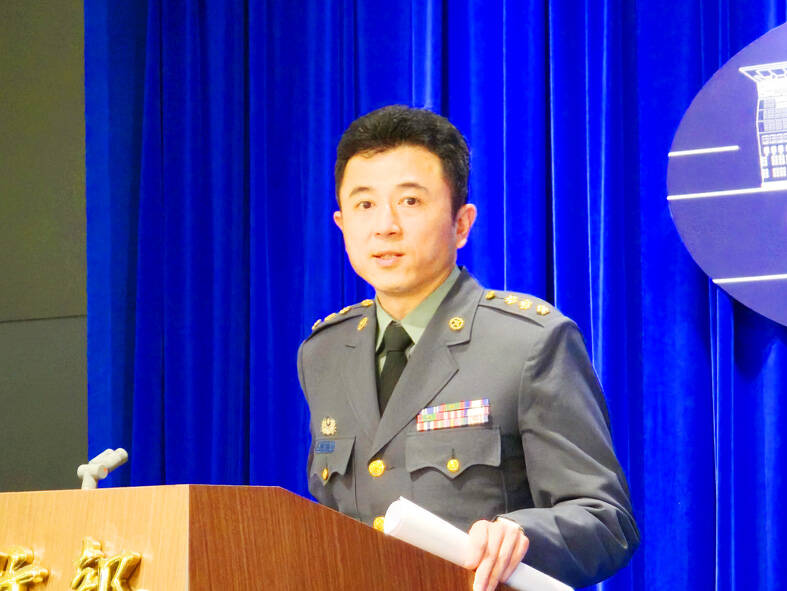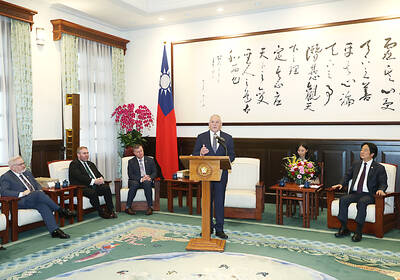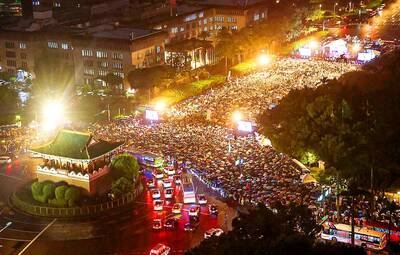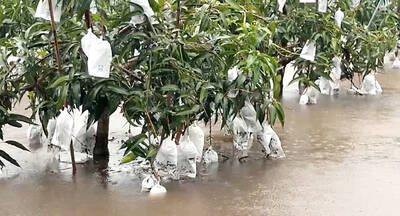National Defense University’s participation in a Defense Challenge event and a separate event it intends to host would deepen the military’s cybersecurity and uncrewed aerial vehicle (UAV) research to ensure that it can boost national defense by leveraging cutting-edge technology, said Rear Admiral Tsui Yi-fong (崔怡楓), chief of staff at the university’s Chung Cheng Institute of Technology.
The university’s team, led by Colonel Lee Yen-hung (李彥宏), were given an Honorable Mention award at the Defense Challenge, at which participants programed drone simulations to perform autonomous flights to scout multiple targets in an environment where Global Navigation Satellite System (GNSS) is denied, and participants cannot use first-person view, Tsui said yesterday.
The university’s team used dead-reckoning calculations to obtain flight data from accelerometer and gyroscope data, he said, adding that its UAV was outfitted with an Nvidia Jetson Nano board and a global shutter single-lens camera.

Photo: Fang Wei-li, Taipei Times
The drone used a Yolov8 computer vision model, with the visuals processed and optimized by converting the files with Nvidia’s TensorRT, a high-performance deep-learning inference software development kit, he said.
The visual optimizations allowed the team’s drones to identify civilian traffic, camouflaged military vehicles and fuel drums, providing high accuracy and immediate responses with limited computing power, Tsui said.
The Defense Challenge event was hosted by the National Science and Technology Council and National Cheng Kung University, he said, adding that it was not directly related to combat simulations.
This year’s challenge simulated an incident in which drones were unable to link up to GNSS during the major earthquake in Hualien County on April 3 last year, he said.
The military hopes to develop new technologies or software that would allow it to overcome such situations, Tsui said.
Separately, National Defense University is preparing for the Military Academy Cup Cybersecurity Competition on May 22 and 23 featuring teams from its Management College, the Chung Cheng Institute, as well as from the Air Force Institute of Technology, the Air Force Academy, the Naval Academy, the Army Academy and Central Police University.
The cybersecurity competition is divided into two parts, the first testing participants’ ability to gather online information, perform reverse engineering, and understand encryption and decryption, as well as their grasp of digital forensics, Tsui said.
In the second part, participants join a “capture the flag” mission, as well as a mission to take over a computer system and achieve specific goals, he said.

‘NON-RED’: Taiwan and Ireland should work together to foster a values-driven, democratic economic system, leveraging their complementary industries, Lai said President William Lai (賴清德) yesterday expressed hopes for closer ties between Taiwan and Ireland, and that both countries could collaborate to create a values-driven, democracy-centered economic system. He made the remarks while meeting with an Irish cross-party parliamentary delegation visiting Taiwan. The delegation, led by John McGuinness, deputy speaker of the Irish house of representatives, known as the Dail, includes Irish lawmakers Malcolm Byrne, Barry Ward, Ken O’Flynn and Teresa Costello. McGuinness, who chairs the Ireland-Taiwan Parliamentary Friendship Association, is a friend of Taiwan, and under his leadership, the association’s influence has grown over the past few years, Lai said. Ireland is

A saleswoman, surnamed Chen (陳), earlier this month was handed an 18-month prison term for embezzling more than 2,000 pairs of shoes while working at a department store in Tainan. The Tainan District Court convicted Chen of embezzlement in a ruling on July 7, sentencing her to prison for illegally profiting NT$7.32 million (US$248,929) at the expense of her employer. Chen was also given the opportunity to reach a financial settlement, but she declined. Chen was responsible for the sales counter of Nike shoes at Tainan’s Shinkong Mitsukoshi Zhongshan branch, where she had been employed since October 2019. She had previously worked

FINAL COUNTDOWN: About 50,000 attended a pro-recall rally yesterday, while the KMT and the TPP plan to rally against the recall votes today Democracy activists, together with arts and education representatives, yesterday organized a motorcade, while thousands gathered on Ketagalan Boulevard in Taipei in the evening in support of tomorrow’s recall votes. Recall votes for 24 Chinese Nationalist Party (KMT) lawmakers and suspended Hsinchu City mayor Ann Kao (高虹安) are to be held tomorrow, while recall votes for seven other KMT lawmakers are scheduled for Aug. 23. The afternoon motorcade was led by the Spring Breeze Culture and Arts Foundation, the Tyzen Hsiao Foundation and the Friends of Lee Teng-hui Association, and was joined by delegates from the Taiwan Statebuilding Party and the Taiwan Solidarity

TRANSPORT DISRUPTION: More than 100 ferry services were suspended due to rough seas and strong winds, and eight domestic flights were canceled, the ministry said Tropical Storm Wipha intensified slightly yesterday as it passed closest to Taiwan, dumping more than 200mm of rain in Hualien and Taitung counties, the Central Weather Administration (CWA) said. As of 11am, Wipha was about 210km southwest of Cape Oluanpi (鵝鑾鼻) and was moving west-northwest at 27km per hour (kph). The storm carried maximum sustained winds of 101kph and gusts reaching 126kph, with a 150km radius of strong winds, CWA data showed. Wipha’s outer rainbands began sweeping across Taiwan early yesterday, delivering steady rainfall in the east and scattered showers in other regions, forecasters said. More heavy rain was expected, especially in the eastern